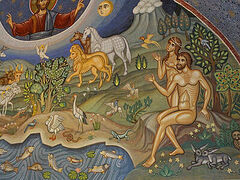 Photo: AP Photo / Maya Alleruzzo
Photo: AP Photo / Maya Alleruzzo
When you start talking to people about Paradise and/or hell, you face a fairly well-established notion of them as a reward or retribution from God in the afterlife. People see Paradise as the final reward for a righteous and good way of life,1 and hell as the final punishment for a sinful and evil one.2
At the same time, they are understood as something external to man, something that he is still approaching and inherits only after death and then only partially—that is, only with his soul, and eventually with his whole being (with his soul and body) after the universal Resurrection and the Last Judgment.
Hell and Paradise are imagined as special external—first spiritual, and then physical—states, certain places and “time periods” of a person’s afterlife.
In this perspective, the relationship with God is built according to a simple business scheme, expressed by the proverb: “You scratch my back and I will scratch yours.” I give God my righteous thoughts, words and deeds during my earthly life, and God grants me eternal Heavenly bliss after death.
If we look at ourselves honestly, it is clear that each one of us, with very rare exceptions, does not fulfill his obligations under the “contract” with God and therefore rightly deserves hell.
Thus, our only hope is repentance on the model of the Gospel Good Thief, who, by his prayer of repentance alone, Lord, remember me when Thou comest into Thy kingdom (Lk. 23:42), was immediately vouchsafed the Heavenly Kingdom by Christ. He managed to “jump into the last car of the departing train” of salvation, as it were.
Based on this example and their vanity, many make a false and crafty conclusion that repentance at the end of earthly life is enough for their salvation, and therefore, before that they can enjoy all the pleasures of life without denying themselves anything.
However, from the Gospel perspective, hell and Paradise are not so much rewards/retributions in the afterlife and people’s “abodes”, as they are the inner states of human hearts here and now, during our earthly lives. Just as the Kingdom of God is within you (Lk. 17:21), so is hell within us.
Besides, if in the afterlife they are separated, so that there is a great gulf fixed (Lk. 16:26) between them and they can’t cross over or each other, then here on earth they often coexist in the same heart,3 are expressed by the same tongue,4 manifest themselves in actions of one and the same person, and are mixed to the point that they are extremely difficult to separate from each other, like the mixing of the wheat and the tares in the Lord’s parable.5
It is imperative for us to understand that hell and Paradise are not somewhere “out there” and in an uncertain moment in the future, but already here and now; that the everlasting Heavenly bliss and torments of hell in the afterlife are the natural fruits and natural consequences of our earthly lives: our intentions, thoughts, decisions, words, deeds, feelings, will, reason, and attitude towards God and our neighbor.
As the Apostle Paul said, Be not deceived; God is not mocked: for whatsoever a man soweth, that shall he also reap. For he that soweth to his flesh shall of the flesh reap corruption; but he that soweth to the Spirit shall of the Spirit reap life everlasting (Gal. 6:7–8). By his own will, words and deeds everyone sows in himself either hell or Paradise, either life or death.6
By committing sin, we already plunge ourselves into the infernal abyss here, incur burning reproaches of conscience, harm our spiritual, mental and physical health, and often kill ourselves; we set ourselves in opposition to others, feud with them and with God, suffering from all this. He who commits a sin thereby punishes himself, for sin as the destruction of relations with God, our neighbors, and the world, and already contains retribution for it.7
Therefore, hell is sin, and sin is hell. Just as a path is inseparable from its goal and is meaningless without it, just as a tree is inseparable from its fruits and loses its meaning without them, so hell is inseparable from sin and is absolutely inconceivable without it.
Unlike the “hell beyond the grave”, the situation with our “earthly hell” is made easier by the opportunity to be distracted from our sins, obscuring them in our consciousness with new interests, work, chores, hobbies and pleasures, pushing them out of our memory and forgetting them as if nothing had happened. Therefore, sin is often perceived by many as a tolerable, acceptable, and even normal pattern of behavior.
Man seeks to drown out his spiritual torments, mental anguish and bodily suffering on earth with sensual pleasures, entertainment, and amusements; for example, with drugs. A secular person is guided by the “commandment” of, “Strive for pleasure and avoid suffering.”8
It is especially easy and convenient for non-believers to “anesthetize” the tragic and painful consequences of sins and even justify them, making them a natural “norm”. “If there is no God, then there is no soul, no existence beyond the grave,” they argue: “if so, then Let us eat and drink; for tomorrow we die (1 Cor. 15:32).”
A person gets used to living irresponsibly and believes that it can continue until his death, which will be followed by non–existence. “As long as we exist, death is not here. And when it does come, we will no longer exist,”9 they argue, like the ancient Epicureans.
In this case, there is no one to answer to, no one from above will judge or punish you. This means that only man himself is the master of his life, he alone is the measure of good and evil, the criterion of truth and reality—in essence, a god to himself. “If there is no God, then everything is permitted.”10 As the ancient godless sophists used to say: “Man is the measure of all things—of the things that are, that they are, and of the things that are not, that they are not.”11
“And what about conscience?” you may ask.
“It’s a chimera created by humans themselves,” they will reply. “The prejudices imposed on us by society about good and evil.”12
This shameless worship of man is the deep psychological cause of atheism and agnosticism, the basis of their rootedness in culture, the source of their power, attractiveness and influence on human minds and hearts.
There is always hedonistic selfishness behind agnosticism and atheism. It is their origin, source, root and foundation. It is in it that they draw their inspiration and driving force.13 Vanity and pride, if not combated, naturally grow in someone’s heart to the point that they supplant and expel faith in God from it, leaving there only faith in himself.
First of all, faith in God is a feat of self-denial for a self-loving person.
The Apostle Paul addresses his disciple and each one of us, Fight the good fight of faith, lay hold on eternal life, whereunto thou art also called, and hast professed a good profession before many witnesses (1 Tim. 6:12).



